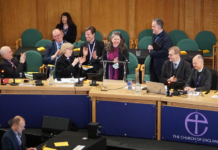On 25th April 2024, Andrew Selous MP, representing the Church Commissioners, gave the following written answers to questions from MPs:
Church of England: Slavery
Dr Matthew Offord MP (Con, Hendon): To ask the Member for South West Bedfordshire, representing the Church Commissioners, whether the Church plans to publicly acknowledge historic links with the chattel slave trade.
Andrew Selous MP (Con, South West Bedfordshire): The Archbishop of Canterbury has been unequivocal on the theology of this issue, noting on his visit to Cape Coast Castle in Ghana in February 2023:
“It was a reminder that the abomination of African chattel enslavement was blasphemy: those who imprisoned men and women in those dungeons saw them as less than human. It is to the Church of England’s eternal shame that it did not always follow Christ’s teaching to give life. It is a stain on the wider church that some Christians did not see their brothers and sisters as created in the image of God, but as objects to be exploited.”
The Church Commissioners has been investigating its historic links to the chattel slave trade since 2019 and published a full, transparent report of the findings in January 2023. More information about the whole project is available here:
Church Commissioners Links to Historic Transatlantic Slavery | The Church of England
The Church Commissioners seek, through the research it has done and its response, to acknowledge the truth of the past, apologise for the wrongs that this research has highlighted, and to address these wrongs through repentance, remembrance, reconciliation, and renewal. The Church Commissioners believe that by addressing its past transparently, particularly this part of our past, the Church and its teachings will be more relevant to more people. The response is an important missional activity that will support the work and ministry of the Church of England in England.
The Church Commissioners are committed to setting up an Impact Investment Fund as part of its response to invest in a better and fairer future for all, particularly for communities affected by historic enslavement. It is hoped this fund will grow over time, reinvesting returns to enable it to have a positive and lasting legacy that will exist in perpetuity and with the potential for other institutions to participate, further enabling growth in the size and impact of the fund. This Fund will be seeded with a £100 million commitment from the Church Commissioners.
Despite recent press speculation, the Church Commissioners has no plans to increase its contribution to the Fund over the planned funding period. It is hoped that growth in the impact fund will also enable grant funding for projects focused on improving opportunities for communities impacted by historic African chattel enslavement.
The Church Commissioners have also committed to undertake further research, including into the Church Commissioners’ history, supporting dioceses and parishes to research and address their historic links with African chattel enslavement, and sharing best practices with other organisations researching their enslavement legacies.



